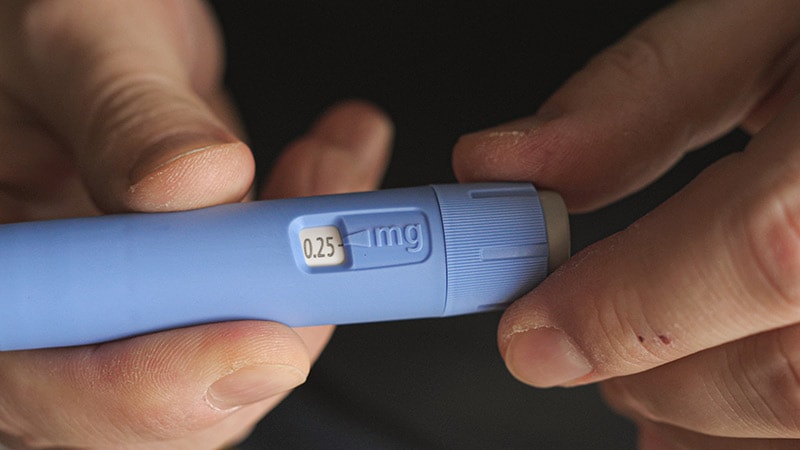[ad_1]
Treatment with the glucagon-like peptide 1 (GLP-1) receptor agonist exenatide had no disease-modifying effects on movement, symptom severity or brain imaging in patients with Parkinson’s disease (PD) enrolled in a phase 3 trial.
“The results of this trial have been eagerly anticipated, and the negative results will be a major disappointment to patients affected by Parkinson’s disease and the Parkinson’s disease research community,” lead author Thomas Foltynie, PhD, from University College London (UCL) Queen Square Institute of Neurology, London, England, said in a statement.
“Given all the positive indicators that have previously been published — the laboratory data, epidemiology findings and results from earlier smaller trials — we were very surprised that this latest trial found no advantage with exenatide in PD patients,” Foltynie told Medscape Medical News.
The study was published online on February 4 in The Lancet.
End of the Road?
Participants included 194 nondiabetic patients (mean age, 60.7 years; 71% men) with moderate-severity PD receiving dopaminergic therapies across six research hospitals in the United Kingdom.
They were randomly allocated (1:1) according to Hoehn and Yahr stage to self-administer subcutaneous injections of exenatide extended release 2 mg or placebo once a week for 96 weeks.
Ninety-two participants in the exenatide group and 96 in the placebo group had at least one follow-up visit and were included in analyses.
The primary outcome was mean Movement Disorder Society–Unified PD Rating Scale part III off-medication scores at 96 weeks for exenatide vs placebo.
This outcome was not met because no statistically significant difference was observed between the groups. Scores increased (worsened) by a mean of 5.7 points in the exenatide group and by 4.5 points in the placebo group (adjusted coefficient for the effect of exenatide, 0.92; P = .47).
There were no signals of efficacy in the secondary outcomes, including on-medication state scores, measures of nonmotor features and quality of life, and changes in levodopa equivalent daily doses — or on other exploratory measures.
The investigators noted that “studies with agents that show better target engagement or in specific subgroups of patients are needed to establish whether there is any support for the use of GLP-1 receptor agonists for Parkinson’s disease.”
“We will be looking to see if there is a subgroup of patients who may benefit and also waiting for the results of trials in Parkinson’s disease and Alzheimer’s disease patients using semaglutide. If positive data emerge from these avenues there may be a reason to perform further trials,” said Foltynie.
Disappointing Results
In a linked commentary, Lorraine Kalia, MD, PhD, with Toronto Western Hospital and University of Toronto, Ontario, Canada, said the study was “well-executed” and the results are “disappointing.”
Kalia noted that support for GLP-1 receptor agonists as disease-modifying therapies for PD came from a phase 2 trial testing lixisenatide with a similar design and positive results.
“Being unable to replicate positive findings of a phase 2 trial in a subsequent phase 3 trial has unfortunately been the norm in trials in patient with Parkinson’s disease,” Kalia wrote.
“This highlights the need to identify a biomarker outcome for phase 2 trials that can predict effects on clinical scores in phase 3 trials, similar to how disease-modifying therapy trials for multiple sclerosis use MRI brain lesions as predictable readouts of clinical relapses,” Kalia added.
This trial was supported by the UCL Comprehensive Clinical Trials Unit, the National Institute for Health and Care Research (NIHR), UCLH Biomedical Research Centre and the NIHR UCLH Clinical Research Facility. Foltynie had served on advisory boards for Peptron, Voyager Therapeutics, Handl Therapeutics, GainTherapeutics, LivingCell Technologies, AbbVie, Bluerock, Bayer, and Bial; and had received honoraria for talks sponsored by Bayer, Bial, Profile Pharma, Boston Scientific, and Novo Nordisk. Kalia had received an honorarium for a lecture and support for travel to attend a meeting from Novo Nordisk.
[ad_2]
Source link : https://www.medscape.com/viewarticle/despite-early-promise-glp-1-disappoints-parkinsons-disease-2025a1000325?src=rss
Author :
Publish date : 2025-02-07 05:58:59
Copyright for syndicated content belongs to the linked Source.
